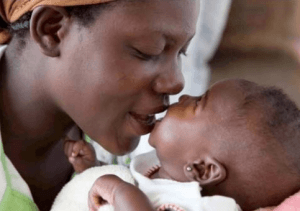Fear of flappy breasts scares mothers from exclusive breast-feeding – Doctor
 Dr. Winfred Ofosu, acting Upper West Regional Director of Health Services, has observed that some lactating mothers deny their babies exclusive breast feeding with the view to protect “their breast from fallen”.
Dr. Winfred Ofosu, acting Upper West Regional Director of Health Services, has observed that some lactating mothers deny their babies exclusive breast feeding with the view to protect “their breast from fallen”.
Women now want their breasts to stand firm and pointing during their life time, and therefore would always provide breast milk substitutes for their babies.
This practice has contributed immensely to the downward trend in exclusive breast feeding in the region, Dr. Ofosu said at the sensitization and re-launching of a Baby Friendly Hospital Initiative (BFHI) in Wa.
He explained that some women expressed the fear that when they breast fed exclusively, their breast become flabby and no longer attractive.
The acting Regional Director of Health Services pointed out that breast feeding was the single most cost effective strategy for child survival due to its numerous advantages.
Early initiation of breast feeding can reduce child and neonatal mortality by 1.5 million deaths globally every year according to the World Health Organization (WHO).
Dr. Ofosu said in 1990, WHO and UNICEF made a statement on how baby facilities could promote breast feeding through some proposed “10 steps to successful breast feeding” and urged facilities in the Region to endeavour to practice those steps in order to promote breast feeding.
On the nutritional situation of children less than five years in the Region, Dr. Ofosu explained that both stunting and wasting were reducing while underweight continue to record marginal increases.
“Every child born should have the opportunity to develop his or her brain to the fullest and if this must be achieved, then malnutrition indicators must be reduced to the barest minimum,” he said.
He however noted that under nutrition was still a problem in the Region, adding that every district in the Region was grappling with the burden of under nutrition.
Dr. Sebastian Sandaari, Lawra District Director of Health Services who made a presentation on behalf of UNICEF, revealed that exclusive breast feeding rates in the Region stood at 63 per cent in 2008 but declined to 52 per cent in 2014.
He pointed out that a child that had been exclusively breast fed had about 14 times chances of survival as compared to one which had not gone through exclusive breast feeding.
Dr. Sandaari added that such children’s level of intelligence was equally higher than the others.
Mrs. Beatrice Kunfah, the Wa Municipal Director of Health Services said breast feeding was the standard goal for child survival and called for the formation of support groups to help promote breast feeding to improve child survival.
She urged nurses to lead by example by practicing exclusive breast feeding to serve as an example for others to emulate.
Mrs. Beatrice Tengan, a Public Health Nurse however raised concern about the inability of nurses to lead by example in practicing exclusive breast feeding due to the nature of their work.
She therefore called for the creation of spaces within health facilities for nurses who were breast feeding to bring their babies close to them so that they could have easy access to breast feed them.
“The women are aware of this and have therefore, started asking questions any time we tell them to practice exclusive breast feeding,” she explained.
Source: GNA
